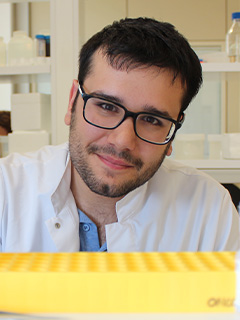HOW CAN WE HELP YOU? Call 1-800-TRY-CHOP
In This Section
CHOP Research Institute Highlights Two Emerging Innovators

The Emerging Innovators Collaborative Research programs recognizes the contributions of non-faculty researchers.
The Emerging Innovators Collaborative Research program, organized by the Office of Academic Training and Outreach Programs (ATOP), recognizes exceptional non-faculty researchers-in-training and research staff nominated by their department chair, division chief, or faculty mentor. Here, we highlight two postdoctoral fellows in the fields of pediatric oncology and cell pathology who presented their high-impact research at sessions in November.
Guillem Pascual-Pasto, PhD
Postdoctoral Fellow
Department of Pediatrics - Oncology
Nominated by: Kristopher Bosse, MD
Presentation title: Targeting Glypican-2 (GPC2) in Pediatric Malignancies With Next-generation Immunotherapies

Guillem Pascual-Pasto, PhD
Dr. Pascual-Pasto and his collaborators are working on two new therapeutic strategies using chimeric antigen receptor (CAR) T cells and antibody-drug conjugates to target GPC2 in high-risk pediatric tumors.
“Understanding the immunobiology behind these tumors is key to designing next-generation and combination immunotherapies able to overcome tumor resistance and immune escape mechanisms,” Dr. Pascual-Pasto said.
GPC2 antibody-drug conjugates modify the tumor environment and work together with other immunotherapies, whereas next-generation GPC2 CAR T cells kill tumor cells and recruit innate immune cells for additional antitumor effect.
“This research aims to develop innovative immune-based therapies for children with cancer by targeting unique tumor-specific antigens such as GPC2,” Dr. Pascual-Pasto said. ““What excites me most about this work is that our preclinical studies in the laboratory set the stage for the potential clinical translation of these novel immunotherapies.”
Ian Henrich, PhD
Co-Founder and VP Research and Development, Merlin Biotech
Former Postdoctoral Fellow
Department of Pathology and Laboratory Medicine – Cell Pathology
Nominated by: Margaret Chou, PhD
Presentation title: Turning Cold Tumors Hot: Development of USP6 mRNA as a Novel Cancer Immunotherapy

Ian Henrich, PhD
Dr. Henrich and his team focus on developing immunotherapy to target and kill cancer cells. They found that expression of the protein USP6 within a cancer cell enhances the immune response against the tumor by producing factors that increase immune cell recruitment and upregulating immune-activating receptors on the tumor cell’s surface. They are working on a novel intratumoral USP6 mRNA-based immunotherapy to treat Ewing sarcoma, a pediatric cancer with few effective treatment options.
“Uncovering new therapies for these patients is clearly important,” Dr. Henrich said. “The ability of USP6 to activate the immune system through multiple, distinct anti-tumor pathways means that we potentially have a combination therapy in one molecule. We're excited not only to advance USP6 mRNA as a novel therapy for Ewing sarcoma, but also to explore its potential use in other cancers.”